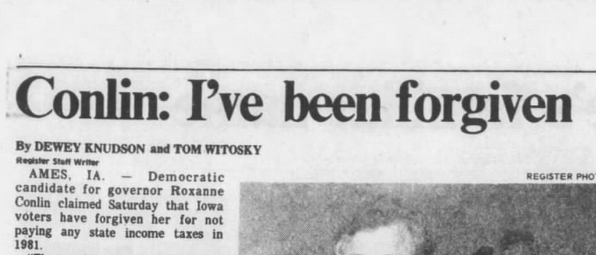By Tom Witosky
Donald Trump’s reported avoidance of paying federal income taxes – possibily for almost two decades – raises a simple, but interesting question for Iowa voters.
Does it matter? And, if it doesn’t matter to voters in 2016, then why did it matter when Gov. Terry Branstad and his supporters made such a big deal of it in his campaigns against Democrat candidate Roxanne Conlin in 1982 and Jack Hatch in 2014?
On Monday, Branstad, whose son, Eric, is running Trump’s campaign effort in Iowa, defended the New York businessman and the disclosure that he took a $916 million loss on his 1995 personal income tax return that likely wiped out any tax liability to the federal government for years. Branstad’s justification can best be defined as the “only a crook can stop another crook” defense.
“He just used the present federal system like my opponents and many others have over the years,” Branstad said as reported by the Des Moines Register. “Probably, he’s the best one to fix it because he knows where the problems are.”
A curious argument to be sure because it is clearly a 180 degree reversal of the viewpoint he took in 1982 after Conlin, whose husband, Jim, who also is in the business of real estate development, ownership and tax sheltering, announced they had not paid state income tax on their 1981 return.
”People who live in glass houses should not throw stones,” Branstad intoned more than once during the campaign. Conlin had taken the position that state tax breaks like sheltering should be changed, but Branstad and then Republican Gov. Bob Ray called her hypocritical for taking the tax breaks and arguing for reform, but not qualified to change the code under the “crooks know how to stop another crook” defense of Trump now being argued.
Conlin’s case and how she handled it is remarkably similar to the Trump case.
— The tax breaks that wiped out liability, in all probability, were the result of the various tax breaks that have long existed for business owners, particularly those in real estate. Interest costs, depreciation, and a host of other legal tax breaks were used by Conlin and Trump. The Conlins also had the ability to deduct their federal tax payment – less than $3,000 – on their state return.
— Conlin, like Trump, refused to the make public her tax returns. In 1982, Republicans howled objecting to her refusal. Their argument – much like the Democrats’ argument now – was that the public was entitled to know how many years the Conlins were able to avoid paying taxes and consistently argued she was hiding something. Conlin’s response, like many Trump supporters, was the release would be a continual story at a time the candidate wanted to talk about other issues.
— Neither Conlin nor Trump had run for elected office before. Conlin’s campaign leadership changed almost monthly, much like Trump’s has. In addition, both candidates have attempted to minimize what voters thought about the rich being able to avoid paying income taxes. Conlin, in a controversial move, actually said that voters had forgiven her in a speech at the 1982 Jefferson-Jackson Day dinner. Trump described himself as “smart” and a “genius” for avoiding taxes.
Trump, entering in the final month of the presidential campaign, is viewed as trailing, but still having a chance to pull the upset against Democrat Hillary Clinton. But, in Iowa, Trump is considered to have a solid lead over Clinton.
Will Trump’s avoidance of paying taxes and his refusal to release his tax returns sway Iowa voters to vote for Clinton or will they decide it doesn’t matter and give the state’s six electoral votes to Trump? Who knows?
But those who covered the 1982 election suspected that voters didn’t actually care all that much about Conlin’s tax returns in determining their vote. Instead, the lurking question was whether the state voters used the tax issue as an excuse when in reality they opposed the election of a liberal female lawyer to the highest office in the state. Sound familiar?
But there would be some small consolation for Conlin, if Trump would carry Iowa. She would know that her 1981 tax filing didn’t matter after all.
Tom Witosky retired from the Des Moines Register in 2012 after 33 years of covering Iowa politics, sports, and business as an investigative reporter. He is also co-author of Equal Before the Law: How Iowa Led American to Marriage Equality on the Iowa Supreme Court’s 2009 decision allowing same-sex marriage.
Top image: Headline and lede from a story in the Sunday Des Moines Register on October 17, 1982.

